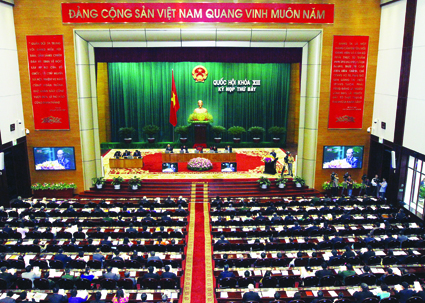According to Vietnam Fisheries Surveillance force, by June 17, China had 136 ships, including five battleships, surrounding the Haiyang-Shiyou 981 oil rig. They kept circling and standing ready to ram Vietnamese vessels, getting as close as 30-50 meters.
In addition, Chinese fishing ships escorted by a coastguard ship formed a line to block and disturb Vietnamese fishing boats engaged in their normal activities at around 30 nautical miles from the oil rig.
By June 18, three Chinese aircraft were seen flying over the oil rig and a Chinese reconnaissance plane (CMS B3536) was also seen flying over the Vietnamese vessels at a height of just 100 meters above the water surface. Two Chinese minesweepers were seen about 18.5 miles from the oil rig’s current location in Vietnam’s waters.
Despite Vietnam’s protests, China has expanded its scale of operation and moved the oil rig to about 60 nautical miles deep inside Vietnam’s continental shelf and exclusive economic zone.
Party General Secretary Nguyen Phu Trong, while receiving visiting Chinese State Councilor Yang Jiechi in Hanoi on June 18, emphasized that Vietnam’s standpoint on its sovereignty over Hoang Sa and Truong Sa archipelagos was unchanged and unchangeable.
The Party, State and people of Vietnam have pursued and will pursue a consistent policy of treasuring its friendship and cooperation with China, Trong said, adding that Vietnam wished to preserve, consolidate and continuously develop bilateral relations in a healthy and stable manner for the essential and long-term interests of both peoples.
The Party leader stressed the severity and negative impacts of China’s placement of the oil rig in Vietnam’s waters on the Vietnamese people, bilateral relations and the regional situation.
He suggested the two sides urgently seek measures to stabilize the situation, creating a premise for basic and long-term solutions to sea-related issues on the basis of agreements reached by the leaders of both nations and international law, especially the 1982 United Nations Convention on the Law on the Sea (UNCLOS).
Yang said the Chinese Party and Government attached special importance to developing a good, stable, long-term relationship with Vietnam, and expressed hope that both sides would continue discussing ways of easing tensions and solving sea-related issues.
In talks with the Chinese State Councilor, Prime Minister Nguyen Tan Dung also reiterated Vietnam’s consistent stance maintained in bilateral communications at different levels.
China’s actions in the East Sea threatened peace, stability, security and safety of navigation and aviation in the region, while causing indignation and hurting the sentiments of Vietnamese people, Dung said, adding this would have negative impacts on cooperation between the two Parties and countries.
He asked China to withdraw its oil rig and ships from Vietnam’s waters and join talks for the settlement of disputes and differences between the two countries by peaceful measures in accordance with international law and the common perception of their leaders.
At the same time, both sides should control the situation to prevent conflict, maintain contact and talks to solve ongoing disputes, Dung said, stressing that Vietnam would resolutely struggle to defend its sovereignty by peaceful measures in line with international law.
Meeting with Yang Jiechi, Vietnamese Deputy Prime Minister and Foreign Minister Pham Binh Minh asserted Vietnam’s sovereignty over Hoang Sa archipelago as well as its sovereign right and jurisdiction over the exclusive economic zone and continental shelf as defined in the 1982 UNCLOS to which Vietnam and China are signatories.
Minh requested that China move its oil rig and escort ships out of Vietnam’s waters, prevent conflicts and hold talks on resolving tensions and differences between the two countries in accordance with international law.
Yang agreed that both sides should work to stabilize the situation at sea, restrain themselves and prevent bilateral ties from worsening.-

